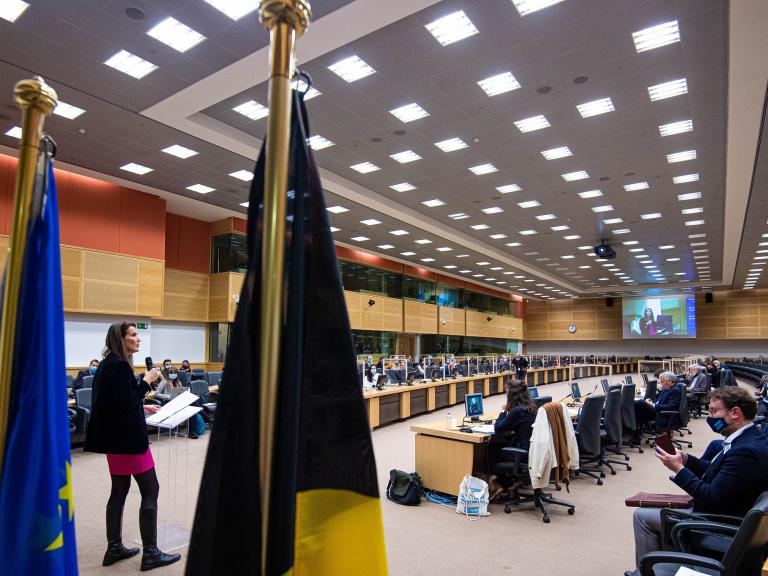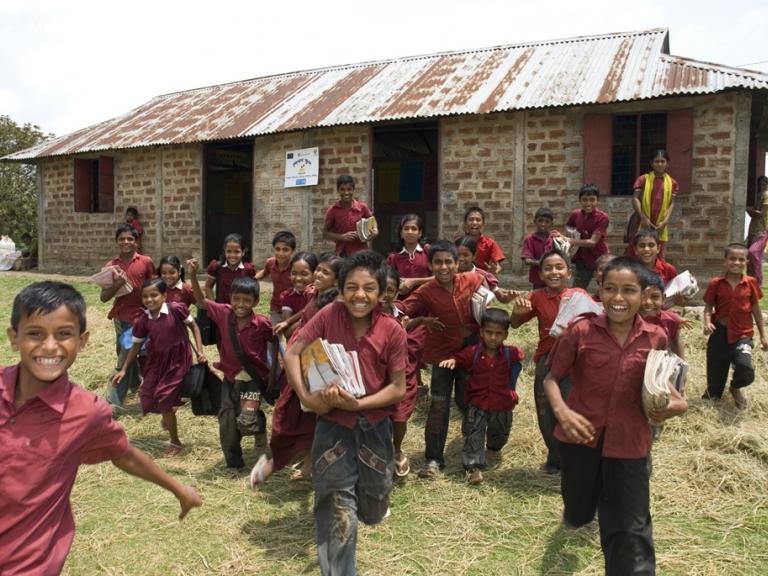-
Last updated on

Macky Sall - President of Senegal and Chairperson of the AU - addresses the dignitaries present at the start of the EU-AU Summit. Seated (left to right): Ursula von der Leyen, President of the European Commission, Charles Michel, President of the European Council, Emmanuel Macron, President of France and representative of the French Presidency,
Moussa Faki Mahamat, President of the AU Commission. © European Union
On 17 and 18 February 2022, the sixth European Union - African Union Summit took place in Brussels. It became a summit that aimed to turn a page and look forward to a hopeful future in a renewed partnership. As Charles Michel, President of the European Council, emphasised: 'It had to be a different kind of summit, based on mutual respect, where we work together as equals, listen to each other better and understand each other better.'
EU, largest investor in Africa
'Both continents are closely linked by invisible threads,' Michel added. 'Your well-being determines ours. Africa's prosperity is also in Europe's interest. Our renewed partnership must be based on trust: transparency, accountability and efficiency.'
Although we often hear that China is very active in Africa, the bare figures paint a different picture. In 2019, the EU invested as much as 241 billion euros in the neighbouring continent, 5% more than in 2016. The US invested 42 billion, China 38 billion.
If both continents share their assets, it could lead to enormous added value. The EU can offer public and private investment, in addition to know-how in green infrastructure and technology. In turn, the AU has significant natural resources, a young and dynamic population ready to get to work, and an impressive capacity for innovation and creativity.

The round table on financing sustainable and inclusive growth, in the presence of Christine Lagarde (3rd from left). © European Union
7 round-tables
No pre-written speeches this time. In order to allow for an open and frank discussion, 7 round-tables were organised, all chaired by 1 or 2 AU countries and 1 or 2 EU countries. There were also 1 or 2 experts participating each time. For example, Christine Lagarde, the woman heading up the European Central Bank, attended the round-table on financing sustainable and inclusive growth.
Prime Minister Alexander De Croo chaired the round-table on health systems and vaccine production, along with his colleagues from Rwanda, Germany and South Africa. Other themes included 'climate change and energy transition', 'agriculture and sustainable development' and 'peace, security and governance'.
The discussions led to an ambitious final statement. And to ensure that the speakers don’t stick to empty words – as was sometimes the case in the past – a follow-up mechanism was established. The extent to which the projects are actually progressing will be closely monitored at the level of EU and AU leaders, as well as by civil society and the private sector.
Some of the results:
- A €150 billion investment package will build diversified, inclusive, resilient and sustainable economies'. Key areas include: the green transition, affordable energy and electricity for all, digital transformation, supporting young entrepreneurs and transport. An African Continental Free Trade Area will aim to facilitate trade.
- There is an urgent need for equitable access to vaccines. By mid-2022, the EU aims to supply at least 450 million vaccine doses to Africa. Team Europe – the EU, its Member States, the European Investment Bank and the European Bank for Reconstruction and Development – has also donated 3 billion dollars through COVAX already. On top of that, 425 million euros will be used to enable the distribution of vaccines and to train medical teams.
Above all, the EU – along with Belgium – is working to build an in South Africa. This aims to enable the local production of vaccines and other medical products. Along with the World Trade Organization (WTO), a compromise around property rights is being worked out.
At the initiative of the EU and AU, the World Health Organization (WHO) is drafting an international pandemic treaty by 2024 to better arm the world against future pandemics.
- The EU and AU want researchers and universities to work together more. More young people, volunteers and students will be exchanged through Erasmus+. Arts and culture will also benefit from greater exchange.
- The EU and AU depend upon each other for their peace and security. Therefore, the EU will increase its support for autonomous peace operations by African defence and security forces ('African solutions to African problems'). 'Security' equally includes maritime security, cyber-security and the battle against terrorism.
A climate of peace will also be developed through the prevention of conflict and violence against women, the promotion of the rule of law and respect for human rights.
- The EU and AU want to take a holistic approach to the issue of migration and mobility. This includes combating human trafficking, better reception and integration of legitimate asylum seekers, better border management and post-return reintegration and identification of pathways for legal migration.
But the root causes of irregular migration and forced displacement must also be addressed. For example, there will be more support for technical and vocational training so that young people and women have better prospects for employment.
- The EU and AU affirm their commitment to effective multilateralism with the UN at its core. This will manifest itself in the reduction of global inequality and the promotion of international collaboration, among other things. The Sustainable Development Goals (SDGs), as well as the AU Agenda 2063, are central to this. The Paris climate agreement also remains crucial. The EU will support Africa in its righteous transition to climate neutrality and green energy.

Family picture - the EU and AU leaders are almost complete. © European Union
The EU-AU summit can rightly be called a success. All the EU leaders participated in the summit, in addition to 40 of the 55 African heads of state. 11 African countries were represented by a senior minister. Only 4 countries were missing: Burkina Faso, Guinea, Mali and Sudan. After all, the AU had suspended them because of a recent coup.
As Charles Michel said at the start of the summit: 'We like to say that the two unions have a single heartbeat. And we would like them to speak with one voice. A Togolese saying states: where the heart is, the feet will follow. Everyone here knows where our hearts are. Now we will lay the path and follow it too.'
Prime Minister Alexander De Croo on the EU-AU Summit
Prime Minister Alexander De Croo expressed satisfaction after the summit. 'We really treated each other as equals.' As an example, he mentioned the agreement concluded with his Congolese counterpart to return unlawfully obtained Congolese art objects.
The discussions on vaccine inequality, which were at times heated – a round-table he had chaired himself – had a happy ending, he thought. Belgium is already doing its best. Our country produced more than 60% of the COVID-19 vaccines exported by the EU and donated 11 million doses, or 1 per Belgian. A pragmatic solution must be found in the very short term on intellectual property rights within the WTO.
Climate collaboration was another important issue. For example, Belgium is currently working on a partnership with Namibia on the production of green hydrogen. This is extremely important for the energy-intensive industry (steel, chemicals, etc.) present in our country. Incidentally, Zeebrugge also gives Belgium a supply port for green hydrogen.
Finally, he felt that our country should be quite proud of organising the summit. 'A very large proportion of key world leaders were received in Brussels and were steered through a successful summit.'
More on Cooperation

EU: more democracy in practice
Geography teacher Rafik Kiouah talks about his participation in a Belgian citizens' panel on a more democratic EU as part of the...

The EU joins forces for external action
The European Union is combining various funding channels into a single instrument: Global Europe. The simplification will give t...
EU: better waste management protects Lake Tanganyika
De EU wil het Tanganyikameer (Centraal-Afrika) helpen beschermen als bron van water, voedsel en inkomsten. Didier Cadelli, coörd...
